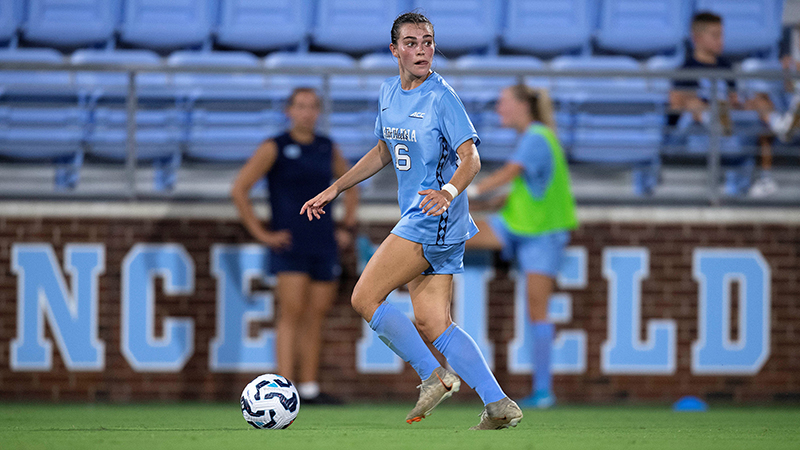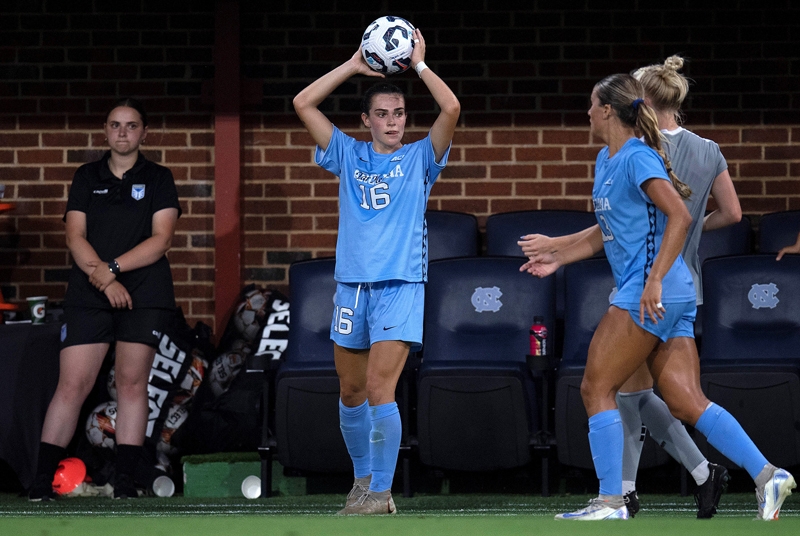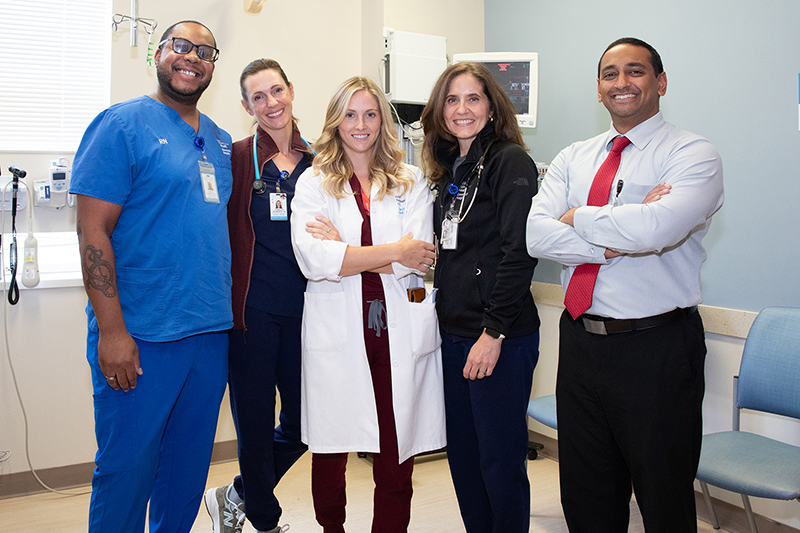One common goal: Emergency Department and Stroke Center partner to save life of young athlete

Migli posing for University of North Carolina 2024 women’s soccer media day.
Photo courtesy of Jeffrey A. Camarati, University of North Carolina Athletic Department
Greenwich Hospital’s Emergency Department (ED) had 27,804 visitors in 2023. That’s roughly 76 patients per day. “It’s never boring,” describes Carlos Charles, RN. As a nurse on the unit, Charles and his colleagues treat people of all ages. “From a seven-day-old to a seventy-year-old,” is how he put it. Seeing patients across the life span has prepared Charles for any case that comes his way. For 22-year-old Olivia Migli, who arrived at the ED on Friday, June 7, 2024, with what she thought was nausea, Charles’ experience and acute instincts saved her life. “If she didn’t come in, she could have had permanent damage.”
Migli recalls feeling extremely dehydrated and nauseous the night before heading to the hospital. “All of my muscles were cramping. I thought I’d go to the ER so I could get fluids and anti-nausea medicine,” she explained. It was when she was in the ED that the other symptoms started to show.
“The original plan was to make her feel better,” said Charles. That involved blood work, establishing an IV with fluids and providing medication for nausea. The results revealed that Migli was in fact, very dehydrated, but according to Charles she looked “visibly better” after being treated.
That feeling changed, however, when she got up from her bed. “I saw that she started stumbling, which was weird to me,” Charles said. He then sat her back down on the bed and asked, “How do you feel?” That is when he noticed Migli’s speech begin to slur and facial drooping on her left side. Up until that point, she showed no signs of neurological deficits. Charles immediately suspected it was a stroke.
“I felt like I was speaking normally,” Migli said. “I didn’t feel like I was having a stroke.”
Charles’ suspicions were quickly verified by Danielle Neuberth, emergency medicine physician’s assistant, and Tania Mariani, MD, assistant director of emergency medicine. After they administered a stroke assessment, the decision was made to call a stroke alert.


Migli during a 2024 preseason game for the University of North Carolina.
Photos courtesy of Jeffrey A. Camarati, University of North Carolina Athletic Department
From there, Migli was placed under the care of Greenwich Hospital’s Stroke Center team. Kunal Desai, MD, interim stroke medical director, and Sabrina Châteauvert, RN, stroke nurse navigator, were the team members on call that day. At the time of the alert, the duo was holding their monthly stroke clinic at 15 Valley Drive in Greenwich. “I took the call, and when I
heard the story, I rushed over to the ED,” said Châteauvert. She evaluated Migli and then called Dr. Desai.
“I heard in her [Châteauvert’s] voice that something was off,” explained Dr. Desai. Both Châteauvert and Dr. Desai have over a decade of experience with stroke patients, so it’s rare for them to encounter a situation they have not seen before. “Once we saw Olivia, it was clear she was having a fairly large stroke, from a deficit standpoint, but also from an imaging standpoint,” Dr. Desai said.
A CT scan revealed that Migli suffered a blockage in her middle cerebral artery, which supplies blood to a significantly large part of the brain, Dr. Desai described. Once that was confirmed, the team gave her tenecteplase, a clot-busting drug used to treat ischemic strokes, which are strokes that occur when a blood clot or fatty plaque blocks a blood vessel in the brain. Her symptoms eventually subsided.
The total time elapsed between Charles first noticing the stroke, Dr. Mariani and Neuberth confirming, and then the Stroke Center team racing across town to the ED was less than 30 minutes. “That’s the gold standard,” said Dr. Desai. “It’s about as well as you can do.” At Greenwich Hospital, the stroke response target time is less than 30 minutes, and the team recently received Target: Stroke Honor Roll-Elite status from the American Heart Association for achieving door-to-needle times within 60 minutes for at least 85 percent of applicable patients, like Migli.
“At every level, this was top-notch work,” praised Dr. Desai. “Having a nurse who can recognize the problem and take the right steps to escalate it; having an ED physician who appropriately sees the patient and then brings them to us. We were then able to get there in a timely manner to make a diagnosis and explore treatment options.”
The ED team and Stroke Center both say that Migli is on the younger side of patients they have seen for stroke, with the exception of those who may have underlying health conditions. Healthline Magazine states that the most common age for stroke is 71.4 years in men and 76.9 years in women. Common risk factors include age, lifestyle and family history – and when those elements are brought into consideration, Migli’s case becomes even more unique.
“Nobody in my family has ever had blood clots or a stroke. It was really quite out of the blue,” said Migli.
Migli recently began her final year of college at the University of North Carolina (UNC) Chapel Hill, where she is a member of one of the top women’s soccer programs in the country. Before enrolling at UNC, she was a four-year member of the soccer team at Duke University. By all standards, she has reached the pinnacle of physical health, and the prospect of becoming a professional athlete is certainly attainable.
With such a bright future ahead of her, the impact of the care she received at Greenwich Hospital was not lost on Charles.
“The magnitude of knowing we were able to save her life did stick with us because no one would expect this to happen to a 22-year-old,” he said.
For the Stroke Center team, getting Migli back to doing what she loves was imperative. “I was just hoping she could get back to soccer,” said Châteauvert.
Migli shared a similar concern. “One of the first questions I asked was, ‘Can I still play soccer?’” Thankfully, for all involved, Migli is back at UNC with her team, but the event has understandably affected her perspective on life. “Life is not granted,” she said. “I have a sense of gratefulness for the things I can do and have been doing.”
Her story is one of “right place, right time.” Migli is originally from Northern Virginia, and her family is based in Charlottesville. She came to Greenwich Hospital because she was visiting her boyfriend who lives in New York City. When she felt unwell, her boyfriend’s mom suggested Greenwich Hospital because of its proximity and the overcrowding that can occur in the NYC Emergency Departments. Her stroke did not happen until she was in the emergency room, and by that time she was surrounded by a group of healthcare professionals well equipped to treat her. “I gotta get to church now,” she said jokingly.
Migli values the care she received at Greenwich during her time of uncertainty. “Everyone was super helpful. They were all attentive and caring. They stayed with me the whole time. They did a great job keeping me calm.”
Her last collegiate soccer season started in August, and she is set to graduate this winter with a certificate in Leadership Development as part of UNC’s Master of Business Administration program.She is undecided about whether to pursue soccer professionally or a career in the sports business, but she is appreciative that she still has the opportunity to choose.
Migli has played through torn ligaments and knee injuries, but this was like nothing she’s ever experienced. The incident taught her a valuable lesson: “Trust yourself and trust your body because you know yourself better than anyone.”

From left: Carlos Charles, RN; Danielle Neuberth, PA; Sabrina Châteauvert, RN; Tania Mariani, MD; Kunal Desai, MD.




